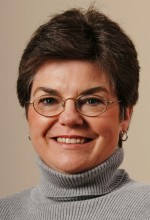Mercy Sister Kathleen Erickson spent 18 years working on the U.S.-Mexico border, and she’s convinced that Americans can’t just say, “We didn’t know.” We have an obligation to learn about our immigrant brothers and sisters, and the conditions that drew them here. We need to act on that knowledge and fight for immigration reform.
“We’re gaining a new consciousness of the interconnectedness of everything,” Sister Erickson said.
When she first arrived on the border in 1991, the immigration debate was barely simmering. U.S. employers liked the cheap labor that came across the border, and officials largely turned a blind eye to the numbers coming to the U.S. desperate to feed their families. It was a mutually beneficial situation sealed with a wink and a nod.
Sister Erickson spent her time running a women’s center, helping teach English and other classes.
Crossing the border “wasn’t a punishable offense” said Sister Erickson, even though it was technically illegal. People worked in the U.S. and freely crossed the border back and forth.
[hotblock]
All of that changed drastically after 9/11, in the wake of which the Department of Homeland Security was created with buckets of money and power. Even though the 9/11 terrorists had entered this country legally, and through customs, suspicion suddenly fell on the perceived strangers in our midst.
Add to that the fear of violence related to the narcotics trade and you had a recipe for scapegoating our poorest neighbors.
“We went to an extreme of fear after 9/11,” said Sister Erickson. “Terrorism, immigrants, drug dealers — they all got mixed up together in the national consciousness.”
Suddenly, the people who had been working at jobs Americans were eager to give them became criminals, “lawbreakers” in the parlance of many a politician.
Sister Erickson’s ministry shifted dramatically. Good, hardworking people found themselves imprisoned. Sister Erickson began to visit the detention centers that sprang up along the border, a journey she compares to “walking into a river of tears.”
Children were separated from parents, families divided, ordinary housewives tarred as criminals. People desperately trying to get their identification papers together heard knocks at the door and were arrested in front of their children. Hardworking people were handcuffed and strip-searched.
The private prison industry blossomed as detention centers filled. And perhaps the real heartbreaker is that for those caught up in this dilemma, there’s virtually no recourse. A “path” to citizenship is a swamp with no outlet, and the kids — the so-called “dreamers” who accompanied their parents to the U.S. as toddlers — are now grown-up, thoroughly American, but at risk for deportation.
Sister Erickson, a tall, slim woman with handsome features and white hair, entered the Mercy Sisters in 1959. She thinks we need a wake-up call on immigration issues. Not only do we need to push Congress to enact legislation, we need to educate ourselves about why immigrants feel compelled to leave their own beloved homelands.
We need to be concerned about our corporations that move to Mexico so they can hire workers at substandard rates with inhumane working conditions. We need to examine our own consumer addiction to cheap foreign clothing and merchandise.
“We hear about immigrants ‘breaking the law,'” says Sister Erickson, “but what about the moral law?”
Recently, a group of U.S. bishops, including Boston Cardinal Sean P. O’Malley, celebrated Mass at the U.S.-Mexico border. Pictures of holy Communion being distributed through the bars of the barrier we have erected as “border security” poignantly illustrated our need to find a better way of relating with our neighbors.
Immigration reform is complex. But the U.S. bishops support immigration reform — and we should support them by writing to our congressional representatives.
PREVIOUS: Rebranding of Christianity for the poor, not middle class
NEXT: Young woman saw needs of Africa, so she started creating jobs




Share this story